Credit: Pixabay/CC0 Public domain
The genes responsible for antimicrobial resistance (AMR) can spread from one microbe to another via circular genetic material called plasmids, and this lateral transfer occurs in the gut. In Applied and environmental microbiologyIowa researchers report that the transmission of certain AMR plasmids can be inhibited by a readily available source: dietary zinc supplements.
“This is the first time we have discovered that zinc inhibits the process of plasmid transfer and that at lower concentrations it has minimal effect on bacteria,” said Melha Mellata, Ph.D., microbiologist and lead author of the study, at Iowa. State University.
This is important, she said, because killing gut bacteria could disrupt the microbiome, which could have detrimental effects on a person’s health. “But if we simply prevent the transfer of plasmids, then we can reduce the spread of antimicrobial resistance.”
AMR infections are a growing problem. Millions of people are diagnosed with AMR infection each year and 35,000 people die from it, according to the Centers for Disease Control and Prevention. When bacteria transfer AMR genes, Mellata said, they often transfer resistance to multiple drugs, meaning a person can have a resistant infection before they even receive antibiotics. Stopping plasmid transfer could help slow the spread of AMR genes.
Researchers in Mellata’s lab studied the link between gut microbiome health and overall health. However, in a recent study, they found that when probiotics and a live salmonella vaccine were given orally to chickens, the Enterobacteriaceae bacteria in the animal’s gut contained fewer plasmids. This observation, Mellata said, prompted them to consider testing other oral treatments to inhibit plasmid transfer.
Logan Ott, a researcher in Mellata’s lab, led the study. He and a team of undergraduate students collected readily available supplements to test their potential ability to inhibit plasmid transfer. They dissolved the products in a test solution, then performed hundreds of reactions in which avian pathogenic Escherichia coli containing a multidrug-resistant plasmid conjugated to an E. coli isolate. human coli without plasmid.
They found a sharp drop in plasmid transmission in bacterial strains supplemented with zinc, compared to bacterial strains without zinc. Additionally, higher doses of zinc correlated with lower levels of plasmid transmission.
These observations were promising, Ott said, but also a bit mysterious. Previous studies observed that heavy metals could induce the conjugation process leading to plasmid transfer. The group then used qPCR to take a closer look at how zinc affected the process at the gene level.
“We found some pretty unique mechanisms for how zinc might actually induce this inhibition, whereas previous literature indicated we should expect more,” Ott said.
Their analysis showed that zinc induced overexpression of replication genes, so much so that it overloaded and likely inhibited the process. They also found that although zinc appeared to favor genes responsible for conjugation, this mineral inhibited specific proteins needed to build the bacterial structures used in conjugation. As a result, the overall transmission process was blocked.
The next steps, Mellata said, are to test the transfer of plasmids with other AMR genes and to experiment with animal models to see if the laboratory results are also valid in vivo. Ott noted that scientists’ understanding of how bacteria interact and share genes in the gut is poorly understood, and that future studies could help elucidate some of these mechanisms.
Mellata is particularly encouraged that such an inexpensive and readily available supplement – zinc – could play a role in combating an emerging threat. “Sometimes the solution can be just to use old things we already have in our closet,” she said. “We just have to make the effort to test it.”
More information:
Logan Ott et al, Dietary zinc supplementation inhibits bacterial plasmid conjugation in vitro by regulating plasmid replication (rep) and transfer (tra) of genes, Applied and environmental microbiology (2024). DOI: 10.1128/aem.01480-24
Provided by the American Society for Microbiology
Quote: Dietary zinc inhibits the transmission of antimicrobial resistance genes in laboratory tests (October 4, 2024) retrieved October 5, 2024 from
This document is subject to copyright. Except for fair use for private study or research purposes, no part may be reproduced without written permission. The content is provided for informational purposes only.



